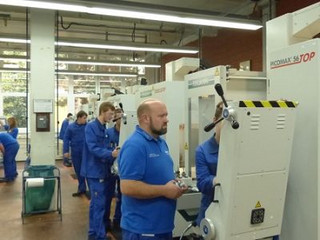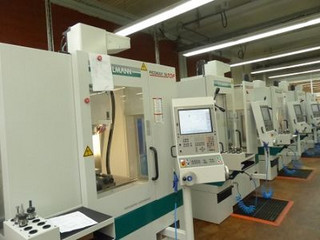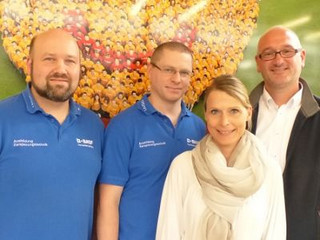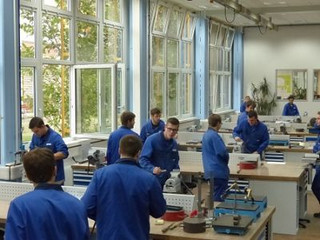TOP Machine Increases Motivation and Appreciation
BASF SE - Three years ago, Project 2020 was started, aiming at offering vocational training in accordance with the most advanced standards. For the realization of this project, several million Euros were invested at BASF, the worldwide leading chemical company. As a result, the existing milling centers were replaced with eight PICOMAX 56 TOP machines by FEHLMANN to be used in the vocational training for metal-working professions. An investment which was above all meant to increase the appreciation among the apprentices.
A total of 36,000 employees, of which 2,800 apprentices from 40 different occupations requiring formal training are currently working at the Ludwigshafen location. This year, 942 apprentices have been recruited. At BASF, the worldwide leading chemical company, people apparently think in different dimensions. This also applies to the investments in metalworking as eight older milling machines were replaced with eight
PICOMAX 56 TOP machines by FEHLMANN for training purposes in one go. In the field of metalworking, industrial mechanics and mechatronics technicians are trained among others. Seven of the new machines are meant for the regular practical training of the apprentices, while one is exclusively reserved for CNC training. Which means:
approximately 150 apprentices pass through this department per year; equaling 14 apprentices per group. Seven apprentices busy themselves with turning, the other seven with milling. This is precisely where the instructors ran into problems, until last year as of the seven older milling machines only two were still in good working order. As Matthias Hemmer, Instructor Mechanical Engineering/Metallurgy at BASF, puts it: „These machines were just about eight years old. In fact, however, we already had ongoing problems with electronics, bearing, etc. over the entire machine life before.
That was not only annoying, but we also saw the targets set for vocational training at risk. One thing is for sure – at the point of time of their final replacement, these machines actually were at the end of their rope. It was our firm intention to avoid such debacle in the future. Therefore, the expected life of the machines was a very high priority to us." For the responsible decision makers, it was a tough job, as there were marked differences between the three shortlisted providers. Each of them had its strengths and still all three were not comparable to each other. The choices were between horizontal spindle or vertical machine, ball screw versus trapezoidal thread, proven or innovative concepts and solutions. For Mladen Stupar, Training Mechanical Engineering/Metallurgy at BASF, the wheat was quickly separated from the chaff: „First of all, we wanted machines which can be operated manually in order to give the apprentices a better feeling for metal cutting. Therefore, mere CNC controlled machines were ruled out in the first place. In general, it can be said, however, that the offers on the market fulfilling our complex and comprehensive requirements are extremely thin on the ground. Therefore, FEHLMANN became our first choice, as their machines come equipped with three handwheels and grant simple operation as well as impressive compactness. Furthermore, a couple of the FEHLMANN machines are employed for actual production in our specialist workshops. So that the apprentices can just carry on in their later professional life without major rethink.“
Motivation through state-of-the-art technology
At present, mini-plant systems are built in the so-called "Fachwerkstätten" - or specialized workshops - at BASF. Mini-plant systems stand for the development of production systems which are first manufactured as lab systems, followed by their production in container size in a second step before the large-scale system is ordered. The main idea behind this concept is to establish and confirm dimensional accuracies and in some cases to also realize highly complex shapes. A second field of activity of the specialized workshops is maintenance. Individual systems are put out of service every two to three years to be completely revised. For this purpose, also gears or transmission parts, shafts or even sealing surfaces must be restored. For necessary cutting tasks, also machines by FEHLMANN are used in these specialized workshops among other things. This was one of the reasons why the responsible people opted for FEHLMANN machines in the training department. The more since the TOP functions perfectly combine manual operation via drilling lever and hand-wheels on the one hand, while complex parts can be machined in a highly uncomplicated and economical way using the Heidenhain TNC 620 and the graphics supported cycles, on the other hand. What is more, also productive work is executed for various departments using the machines. Andreas Schelwach, also Training Mechanical Engineering/Metallurgy at BASF, goes on and says: „Our goal is and has always been to train apprentices on state-of-the-art machines to allow the young people a smooth and fast transition into their later professional life. As opposed to the other providers, FEHLMANN machines offer the additional advantage that the machine is a closed system, preventing chips and coolant from being spilled onto the floor. Apart from this, we simply wished to motivate. According to our experience, state-of-the-art technology is the perfect way to achieve just that.“ For the responsible people at BASF, however, also service and spare part delivery, as well as availability including potential waiting times at customs, were big issues.
Thanks to FEHLMANN's warranty to deliver spare parts right up to the workbench within 24 hours, however, the chapter was closed quite quickly.
Since 2013, the eight
PICOMAX 56 TOP machines have now been in operation. The machine exclusively used for CNC training (Heidenhain TNC 620 control unit) additionally disposes of a tool changer. In the meantime, seven groups of apprentices have been trained on the machines. With quite some success as it appears, as Mladen Stupar states: „These machines are state-of-the-art three-axis vertical machining centers offering manual operation. The apprentices receive the machines very well and the machining centers appear to indeed have a motivating effect. To put it more casually, it is the iPad generation which approaches such machines without any reservation whatsoever.“
Incidentally
Kerstin Staub, in charge of recruiting apprentices at BASF:
„It is important that the apprentices get the opportunity to appreciate their work, as we may not underestimate the expectations, demands and desires of young people. By all means, they wish to know for what am I doing this and they want to see results.“
Interesting side note
At the end of the year 2013, BASF employed 2,800 apprentices, of which 96.6% were retained after having completed their vocational training. In 2014, a total of 942 apprentices have been recruited so far.
Contact
BASF SE
Ms. Kerstin Staub
67056 Ludwigshafen / Germany
Phone +49 621 60 72654
www.basf.com/ausbildung




